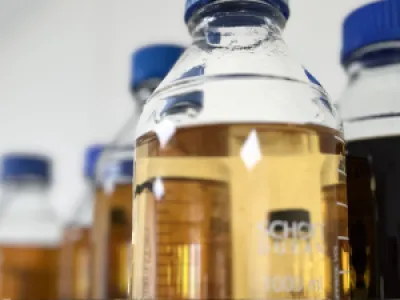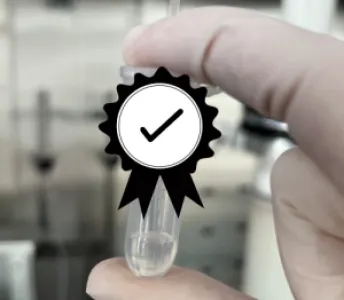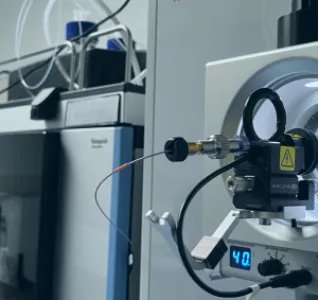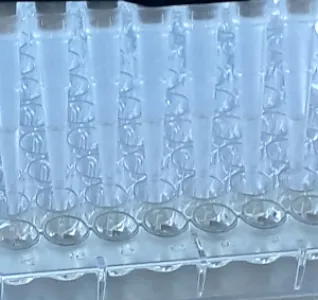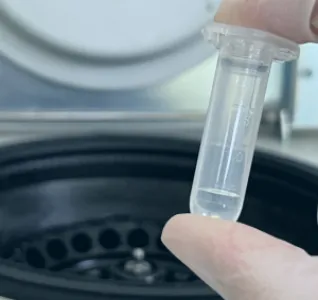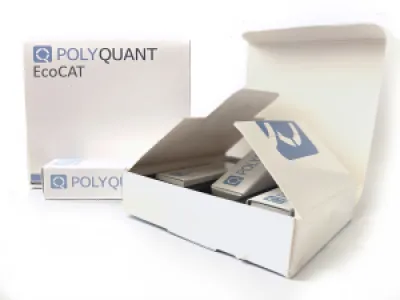PolyQuant GmbH
Booth number: B68-11
www.polyquant.com
About us
PolyQuant provides standards, services, and supporting bioinformatics for proteomics with a focus on quantitative mass spectrometry. Based on our profound expertise, PolyQuant offers full services for quantification of proteins in biological and clinical samples and bridges the gap between basic research and routine quantification processes.
Our special expertise in the detection and safety assessment of host contaminant proteins (HCPs) from purified therapeutic proteins (mAbs) and more complex samples, like therapeutic phages, has been successfully applied in a variety of projects over all production stages. We also support biomarker discovery and validation and development of diagnostics (e.g. Cov-MS reference standard for detection of SARS-CoV-2 infection or diagnosis of bladder cancer), combining advanced MS methods and machine learning.
Core Technology
Since almost 20 years, we use our proprietary QconCAT technology for multiplexed absolute quantification of several tens to hundreds of proteins in a single mass spectrometry experiment. QconCATs are also perfectly suited for isoform-specific protein quantification, determination of stoichiometry (protein complexes or whole phages) and protein quality control.
Services:
production of custom protein standards for LC-MS/MS (QconCATs, labelled proteins)
discovery proteomics (deep screening of complex samples, proteome profiling, differential protein analysis)
absolute protein quantification
LC-MS/MS method development
Application areas:
HCP quantification from early production to release testing
analysis of complex biological samples (cell lysates, bacterial cultures, body fluids, biomarker research, phage analytics)
biomarker discovery and validation (plasma, urine, CSF)
Address
Industriestraße 1
93077 Bad Abbach
Germany
E-mail: info@polyquant.com
Phone: +49 9405 9699910
Internet: www.polyquant.com
Contact person:
Products & Services
Host contaminant protein detection & quantification via LC-MS/MS
Antibody characterization (binding profile / coverage analysis, peptide mapping, epitope analysis, purity)
Biomarker studies
specific and precise multi-protein quantification in complex samples / patient samples
isotope-labelled quantification standards (QconCATs, fully labelled proteins)
QconCAT-Standard for quantitative LC-MS
QconCATs are heavy isotope labelled reference standards for absolute protein quantification using mass spectrometry. Our proprietary technology facilitates parallel quantification of dozens of proteins in a single experiment and can be applied to diagnostics, biomarker validation, drug development, food safety, clinical studies etc. QconCATs are custom-made for individual applications based on the customer’s requirements, delivering sensitive and reproducible results. Customer's can build on PolyQuant's over 15 years of experience to design the optimal standard for their application.
Protein Quantification Service
PolyQuant offers services for absolute protein quantification from any type of biological sample (cell cultures, body fluids, food analytics), e.g. relative comparisons of full proteomes to the absolute quantification of specific protein isoforms.
Host Contaminant Protein Detection & Quantification
PolyQuant offers sensitive and quantitative detection of host contaminant proteins by mass spectrometry. Our method is independent of antibodies and thus can be applied to any production organism. The method is equally suited to analyze purified proteins or more complex therapeutics, e.g. bacterial phages. Our sample preparation technique has been successfully applied even to difficult matrices, like complex buffers or gels.
Our services start from quick screenings to support the optimization of the purification processes, up to GMP-certified release testing of therapeutic proteins and phages.
Biomarker Research
PolyQuant offers a full service for biomarker studies, starting from optimal sample preparation over first screening studies to optimized assays for the precise quantification of selected protein biomarkers. We offer bioinformatic and statistical support, as well as modern machine learning techniques, to define an optimal set of biomarkers.
PolyQuant has been part of the international biomarker project DecanBio and holds a European patent for detection of bladder cancer from urine samples.
Discovery Proteomics
PolyQuant offers analysis of unknown samples and comparative protein expression studies (gene set enrichment, time curves, protein expression, proteome profiling)
CHOcoCAT - Targeted measurement and absolute quantification of CHO-derived host cell proteins
PolyQuant’s CHOcoCAT Kit provides 86 reference peptides for absolute protein quantification of 29 common and critical CHO-specific host cell proteins (HCP). The peptides are grouped according to abundance in CHO cells onto two individual, completely 15N labelled, QconCAT proteins.
QconCAT technology is compatible with various sample preparation protocols (e. g. in-solution, FASP, SP3) and different machine methods (e.g. DIA/SWATH, PRM/MRM, SureQuant) and enables easy setup of multiprotein methods.
EcoCAT - Targeted measurement and absolute quantification of E. coli-derived host cell proteins
PolyQuant’s EcoCAT Kit provides 100 reference peptides for absolute protein quantification of 48 common and critical E. coli-specific host cell proteins (HCP). The peptides are grouped onto two individual, completely 15N labelled, QconCAT proteins.
QconCAT technology is compatible with various sample preparation protocols (e. g. in-solution, FASP, SP3) and different machine methods (e.g. DIA/SWATH, PRM/MRM, SureQuant) and enables easy setup of multiprotein methods.
HEKcoCAT - Targeted measurement and absolute quantification of HEK-derived host cell proteins
PolyQuant’s HEKcoCAT Kit provides 119 reference peptides for absolute protein quantification of 38 common and critical HEK-specific host cell proteins (HCP). The peptides are grouped according to abundance in HEK cells onto two individual, completely 15N labelled, QconCAT proteins.
QconCAT technology is compatible with various sample preparation protocols (e. g. in-solution, FASP, SP3) and different machine methods (e.g. DIA/SWATH, PRM/MRM, SureQuant) and enables easy setup of multiprotein methods.




